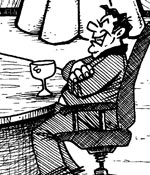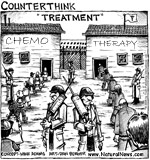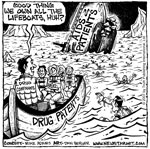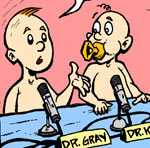What You Can Do About Stress, Depression, Anxiety and Insomnia
| Share on Facebook | Share on Twitter | Share on Google+ |
Anxiety insomnia, and when you need to wake early and refreshed to take care of your family and get off to work, insomnia causes anxiety. Here are some suggestions on how to break the vicious cycles of anxiety, stress, depression, and insomnia that can cause so much disruption in your life.
The Relationship between Anxiety and Insomnia
Insomnia is a condition of inability to fall asleep or stay asleep, or waking up too early in the morning. About 30 per cent of all adults in the United States have insomnia on any given night, and 10 per cent have chronic insomnia, difficulty sleeping every night.
We may not know we are anxious, but we always know when we can't sleep. Insomnia may be one of the first symptoms of a condition known as generalized anxiety disorder. For some people, problems in getting enough sleep cause or exacerbate insomnia. For others, worrying keeps them awake night—including worrying about staying awake at night! Anxiety and insomnia can become a vicious cycle.
The Two Principles Kinds of Anxiety-Induced Insomnia
Insomnia may be acute or chronic. Acute, short-term insomnia is usually precipitated by a specific event. The stressor could be the death of a loved one. It could be worries about being able to pay monthly bills. Changes in the weather and changes in surroundings while traveling are very common triggers of short-term insomnia.
Acute insomnia usually passes when the stress is resolved. Only if the stress lasts more than about a month is medical treatment needed.
Chronic, long-term insomnia is a different matter. People who have chronic insomnia have difficulty falling asleep, staying asleep, or waking up too early for a month or more. Chronic insomnia is not necessarily caused by a stressful event, although stress can make it worse. Researchers estimate that 30 to 40 per cent of people who have chronic insomnia have the condition because of hereditary factors.
Other causes of chronic insomnia include:
- Low melatonin levels, due to sleeping in a room with too much light, or genetics
- High levels of stress hormones
- High levels of growth hormone
- Inflammation caused by over activity of the immune system
- Chronic pain
- Physical illness
- Restless legs syndrome
- Bipolar disorder
- Depression
All of these conditions are made worse by anxiety, and anxiety is made worse by all of these conditions. Treating anxiety can relieve both daytime dysfunctions and nighttime inability to sleep.
What Are Some of the Methods Used to Treat Anxiety that Causes Insomnia?
Professionals use many techniques to relieve anxiety. One of the first signs of success is better sleep at night. Some of the techniques a therapist might employ are:
- Progressive muscle relaxation. In this method, the therapist teaches the patient to tighten and then release muscles all over the body, starting with the toes and working upward. Usually patients fall asleep before they have to furrow their brows.
- Biofeedback. In this method, machines measure sleep-inducing behaviors so the user can reinforce them.
- Stimulus control. This method teaches people with insomnia to be less sensitive to unavoidable nighttime stimulation.
- Paradoxical intention. Willing to stay awake, people fall asleep.
- Imagery. This can be the well-known counting sheep, or other practicing other monotonous, sleep-inducing mental images.
But you don't necessarily have to see a therapist to get better sleep. There are also things you can do on your own.
Five Tips for Reversing Chronic Insomnia
- Exercise more during the day. Even a five-minute workout can help you sleep better at night. The more intense the exercise, the more it helps you sleep.
- Avoid taking naps, especially in the late afternoon or evening. Instead, take a brisk walk to keep yourself awake during the day, making it easier to fall asleep at night.
- Minimize your consumption of alcohol, caffeine, and nicotine. Many people take a drink to fall asleep, but the resulting sleep quality is usually poor. The effects of caffeine and nicotine usually last for four to six hours, so avoiding both of these stimulants after early afternoon will help.
- Keep a set schedule for going to bed and getting up in the morning, making sure your schedule allows for at least six to eight hours of uninterrupted sleep. This will help train your body to sleep.
- Create a bedtime routine, such as turning off the television at a set time no matter what is on, taking a warm bath, doing a light activity like knitting or even washing the dishes, turning down the lights about 30 minutes before it's time to go to bed, or changing the temperature levels in your bedroom. Eventually these habits will become cues that tell your brain it is time to sleep.
What about insomnia and depression? If you have mild to moderate depression, taking care of anxiety will often relieve your insomnia. Then you are more free to deal with depression symptoms that occur during waking hours.
Selected References:
Rickels K, Rynn M. Overview and clinical presentation of generalized anxiety disorder. Psychiatr Clin North Am. Mar 2001;24(1):1-17.
-
Skin CareMen Skin Care
-
Free ResourcesFree eBooks
-
Every human being is the author of his own health or disease.Buddha
-
Featured Health Supplement
 If you find a product that is as effective as Total Balance, and is better value for money, let us know and we will give you a refund equivalent to your entire purchases of Total Balance…retrospective.
If you find a product that is as effective as Total Balance, and is better value for money, let us know and we will give you a refund equivalent to your entire purchases of Total Balance…retrospective.
-



















